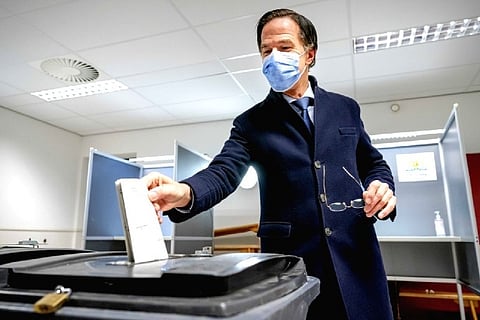

Rutte's center-right VVD won 35 of the 150 seats in the country's House of Representatives, the lower house of Parliament, according to early results cited by the Dutch news agency ANP based on over 90 per cent of votes counted, reports Xinhua news agency.
In the 2017 elections, the VVD won 33 seats.
Rutte, 54, has been in office since October 2010 and now he is likely to start his fourth term as Prime Minister.
In 2017, the VVD formed a government coalition with the centre-right Christian Democratic Appeal (CDA), the centre-left D66 and the centrist Christian Union.
On January 15 this year, Rutte's cabinet resigned over a so-called child welfare benefits scandal, in which parents were wrongly accused of fraud.
D66, led by former diplomat Sigrid Kaag, was the other big winner with 24 seats in Parliament, five more than four years ago.
The CDA came in third, falling to 15 seats from 19 in 2017. The Christian Union retained the five seats it won four years ago.
The three winning parties (VVD, D66 and CDA) are projected to hold 74 seats. They will need a fourth partner to govern.
The final results of the election are scheduled to be announced on March 26.
As per tradition, House of Representatives Speaker Khadija Arib on Thursday appointed two so-called "explorers", Annemarie Jorritsma (VVD) and Kajsa Ollongren (D66), to map out the possibilities for cooperation in a new government coalition.
Just like four years ago, Rutte has ruled out cooperation with the right-wing populist Party for Freedom (PVV) of leader Geert Wilders.
The PVV is projected to hold 17 seats, three less than in 2017.
Due to the coronavirus pandemic, the elections were spread over three days from Monday to Wednesday.
With a population of a little over 17 million people, the country has an electorate of around 13.2 million.
Visit news.dtnext.in to explore our interactive epaper!
Download the DT Next app for more exciting features!
Click here for iOS
Click here for Android